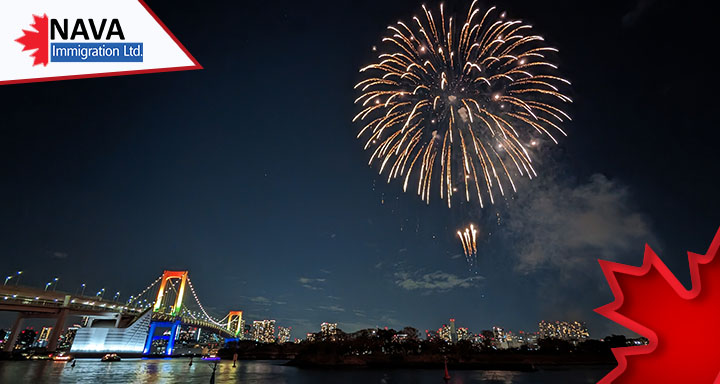Interesting Facts About Canada To Celebrate Canada Day
July 1 marks Canada Day, signifying 157 years since the passing of the Confederation Act and the nation’s formal creation. Every year, this day is filled with celebrations throughout Canada, including parades, concerts, fireworks, picnics, etc. Well, did you know that for more than 100 years, Canada Day used to be called ‘Dominion Day’? Read further to know some of the most interesting facts about Canada to celebrate Canada Day.
1. 23% Of Canada’s Population Is Foreign-Born
Canada boasts one of the world’s most diverse populations, owing largely to progressive immigration policies which date back to 1967.
As a result of these significant immigration rates, as of the 2021 census, nearly one in four people in Canada were immigrants, born outside of Canada and holding different citizenship. This is the largest proportion of immigrants in the Canadian population in 150 years and the highest rate of immigrants among all G7 nations.
2. Canada Occupies Over Six Time Zones
Canada is the second-largest nation in the world, covering over 9.9 million square kilometers or 3.8 million square miles. It also boasts the world’s longest coastline, spanning 243,042 kilometers.
Such is the size of Canada that the nation spans six time zones, including:
- Pacific Standard Time (PST)
- Mountain Standard Time (MST)
- Central Standard Time (CST)
- Eastern Standard Time (EST)
- Atlantic Standard Time (AST)
- Newfoundland Standard Time (NST)
3. Canada Has A Museum For Immigration
Located in Pier 21 in Halifax, Nova Scotia, the Canadian Museum of Immigration is Canada’s sixth national museum. Packed with features, exhibitions, and events, the museum tracks over 400 years of immigration to Canada – telling the stories of Canada’s immigrants. Museum-goers can even trace their own family’s history of immigration through Canada with the help of the Scotiabank Family Center.
The museum is located at Pier 21 because of the site’s prominence in Canadian immigration. Between 1928 and 1971, around one million immigrants landed in Canada at the pier.
4. Canada Has The Largest Number Of Moose Population In The World
While Canada’s national animal is the beaver, the nation is often noted for its other wildlife as well, including polar bears, narwhals, wolves, and moose.
The nation boasts the world’s mightiest moose population, ranging from 500,000 to 1,000,000 individuals nationally. Moose can be found in almost every province and territory in Canada.
5. Canada’s National Sports Is Hockey and Lacrosse
While often associated with hockey, Canada has two national sports. According to the National Sports of Canada Act, while ice hockey is recognized as Canada’s national winter sport, lacrosse is the national summer sport.
Canada performs exceptionally in both sports, ranking highly in international competition.
6. Surprising Canadians
While only boasting a population of 41 million people, Canadians can often be found at the apex of their fields across industries and subjects. Some examples of influential people you might not believe are Canadians are:
- Alexander Graham Bell
- James Cameron
- Guy Laliberté (Founder of Cirque du Soleil)
- Joni Mitchell
- Elliot Page
- Shania Twain
- Margaret Atwood
- James Naismith (creator of basketball)
7. Half Of The World’s Lakes Are In Canada
Another one of the interesting facts about Canada to celebrate Canada Day is its lakes.
Canada boasts more lakes than anywhere else in the world. In fact, according to Statistics Canada, the nation has access to over 20% of the world’s surface freshwater and 7% of the world’s renewable water flow.
Canada is home to over two million lakes. Among these lakes is ‘Pekwachnamaykoskwaskwaypinwanik,’ a lake located in Manitoba. The lake boasts the longest place name in Canada, which translates from the Cree language to mean ‘where the wild trout are caught by fishing with hooks.’
8. Canada’s National Parks Are Larger Than Many Nations
Thirty-eight national parks are present in Canada, covering more than 340,000 square kilometers, approximately three percent of the nation’s total landmass.
In comparison, Japan’s total size is 377,000 kilometers, while Germany’s spans 357,000 kilometers. Thus, Canada’s national parks are cumulatively as large as those in either of these countries.
9. 90% Of Canadians Live Within 100 Miles Of The US-Canada Border
While literally the second largest nation in the world, Canada is also densely populated relative to its overall size.
90% of Canada’s population lives within just 100 kilometers of the nation’s southern border.
10. Canada Is The Second-Most Educated Nation In The World
According to data from the Organization For Economic Cooperation and Development (OECD), Canada has the second-most educated population in the world.
The OECD measures the proportion of the population that has completed tertiary education, i.e., the proportion of the population that has completed the highest level of education, by age group.
Canada has been surpassed only by South Korea, which is the most educated country in the world today.
11. Canada Produces Most Of The World’s Maple Syrup
In 2021, Canada produced 100 million kilograms of maple syrup nationally. The nation boasts over 6,000 maple farms and more than 54 million maple taps cumulatively, thus making it a powerhouse in the world of maple syrup production.
Well, maple syrup can be a lucrative business in Canada and can even be the subject of scandal. In 2021, an investigation led to the discovery of significant theft of maple syrup—3,000,000 kilograms to be exact—from a storage facility in Quebec. The approximate valuation of the maple syrup stolen, when adjusted for inflation, was $24.1 million CAD, thus making this the most valuable heist in Canadian history. The six culprits were arrested in December of the same year.
12. Canada Has The Longest Street In The World.
Another one of the interesting facts about Canada to celebrate Canada Day is Yonge Street.
Yonge Street is located in Toronto, Canada, and boasts the title of the longest street in the world. Named after Sir George Yonge, the former British secretary of war, the street is one of the oldest in all of Canada, dating as far back as 1794.
In addition, Yonge Street’s length has been called into question, with critics citing that the street is often conflated with Ontario Highway 11 when taking measurements – artificially increasing its length. Irrespective of this, even disregarding Ontario Highway 11, Yonge Street measures 56 kilometers in length, making it the world’s longest.
13. The Coldest Ever Temperature Recorded In Canada Was –63°C
Recorded in 1947, at the village of Snag, in the Yukon Territory – Canada’s coldest ever-recorded temperature was –63°C.
For reference, according to the government of Canada, at –27°Cindividuals risk windburn, frostbite, and hypothermia.
14. Canada Has $1 Million Coin
The aptly named ‘Big Maple Leaf’ is a gold coin produced by the Royal Canadian Mint in 2007 – and valued at $1 million CAD. In fact, the Royal Mint created five of these coins at their Ottawa facility.
The Coin weighs 100 kilograms but is only 530 millimeters in diameter. The Big Maple Leaf is also noted for its unparalleled gold purity in the Guinness Book Of World Records.
As of March 2017, one Big Maple Leaf is valued at $4 million USD.
15. Canadian Innovation
Throughout theory history, Canadians have made significant contributions to the world through the inventions and innovations they pioneered.
Some of the most impactful Canadian inventions include:
- Java programming language
- Sonar
- The alkaline battery
- The garbage bag
- Insulin
- Artificial cardiac pacemaker
- Film colorization
- The Ambrosia apple
- The California roll
- Hawaiian pizza
16. Canada and Denmark Had Been At War From 1973 To 2022
The Whisky War is a bloodless war between the King of Denmark and Canada over Hans Island. Between 1973 and 2022, the island was disputed between Canada and Denmark, though never resulting in direct conflict/ violence.
In 1984, Canadian soldiers placed a Canadian flag and a bottle of Canadian whisky on the island. Later that same day, the Danish Minister of Greenland Affairs came to the island with a Danish flag and a bottle of Schnapps.
This would begin the mighty exchange of flags and alcoholic beverages as both nations sought supremacy on the island. In 2022, the ‘conflict’ was finally resolved with the implementation of a land border across Hans Island, thus making it so that Canada and Denmark technically share a land border now.





